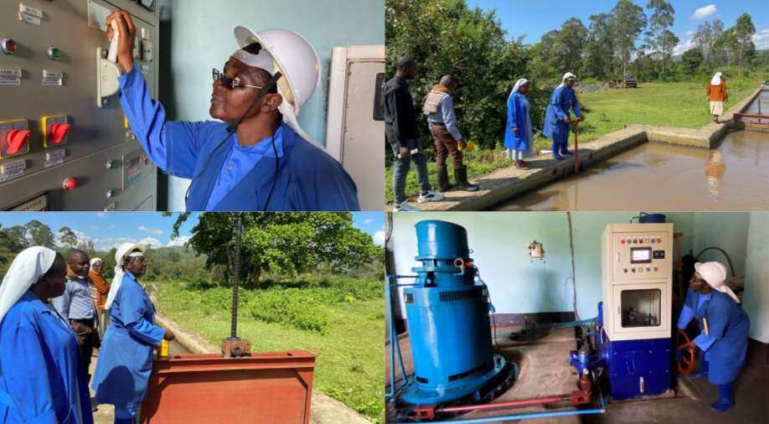Sister Alphonsine Ciza spends most of her day in gumboots, white veil tucked under a builder's hat, manning the micro hydroelectric plant she built to overcome daily electricity cuts in her town of Miti in eastern Democratic Republic of Congo.
She works around the clock with a team of nuns and engineers, greasing machinery and checking the dials of a generator that is fed from a nearby reservoir.
The mini plant lights up a convent, church, two schools and a clinic free of charge.
Without the plant, residents would only have electricity two or three days a week for a few hours.
"This is the alternator that produces the current and here we have the cabinet that sends the current to the population. It's here that we make adjustments, it's called the electrical cabinet," said Ciza, 55, a portable voltage meter slung around her neck in the town of 300,000 inhabitants near the border with Rwanda.
Blackouts are a daily disruption in the Congo, a vast central African country of around 90 million people that sources most of its electricity from a run-down and mismanaged hydropower system.
The government has worked with foreign partners in an effort to increase the capacity of the mineral-rich nation's ailing grid. Critics say the new projects focus too much on powering mines and exporting electricity to neighbouring countries.
Despite millions of dollars in donor funding, only around 20 per cent of the population has access to electricity, according to the World Bank.
Fed up with relying on candlelight and costly fuel-powered generators, Ciza started raising money in 2015 to build the hydropower plant.
She picked up skills as a young nun, repairing electrical faults around the convent, which convinced superiors to send her to study mechanical engineering.
It took Ciza's convent three years to gather the required $297,000 (€284,897) and build the plant, which generates between 0.05 and 0.1 MW.
Thanks to Ciza's efforts, students at Miti's Maendeleo secondary school can now learn computer skills from screens rather than from books.
"It was rare to find power during the day. We had to use fuel for the generator, but buying fuel was very expensive. It was no longer possible at some point, so we were forced to stop and only teach theory for the computer science course," said headmistress Mweze Nsimire Gilberte.
Latest Stories
-
Real Madrid beat Sevilla to keep pressure on leaders Atletico
56 minutes -
Liverpool put six past Spurs to go four points clear
58 minutes -
Manchester United lose 3-0 at home to Bournemouth yet again
1 hour -
CHAN 2024Q: ‘It’s still an open game’ – Didi on Ghana’s draw with Nigeria
1 hour -
CHAN 2024Q: Ghana’s Black Galaxies held by Nigeria in first-leg tie
2 hours -
Dr Nduom hopeful defunct GN bank will be restored under Mahama administration
3 hours -
Bridget Bonnie celebrates NDC Victory, champions hope for women and youth
3 hours -
Shamima Muslim urges youth to lead Ghana’s renewal at 18Plus4NDC anniversary
4 hours -
Akufo-Addo condemns post-election violence, blames NDC
4 hours -
DAMC, Free Food Company, to distribute 10,000 packs of food to street kids
5 hours -
Kwame Boafo Akuffo: Court ruling on re-collation flawed
6 hours -
Samuel Yaw Adusei: The strategist behind NDC’s electoral security in Ashanti region
6 hours -
I’m confident posterity will judge my performance well – Akufo-Addo
6 hours -
Syria’s minorities seek security as country charts new future
6 hours -
Prof. Nana Aba Appiah Amfo re-appointed as Vice-Chancellor of the University of Ghana
7 hours

